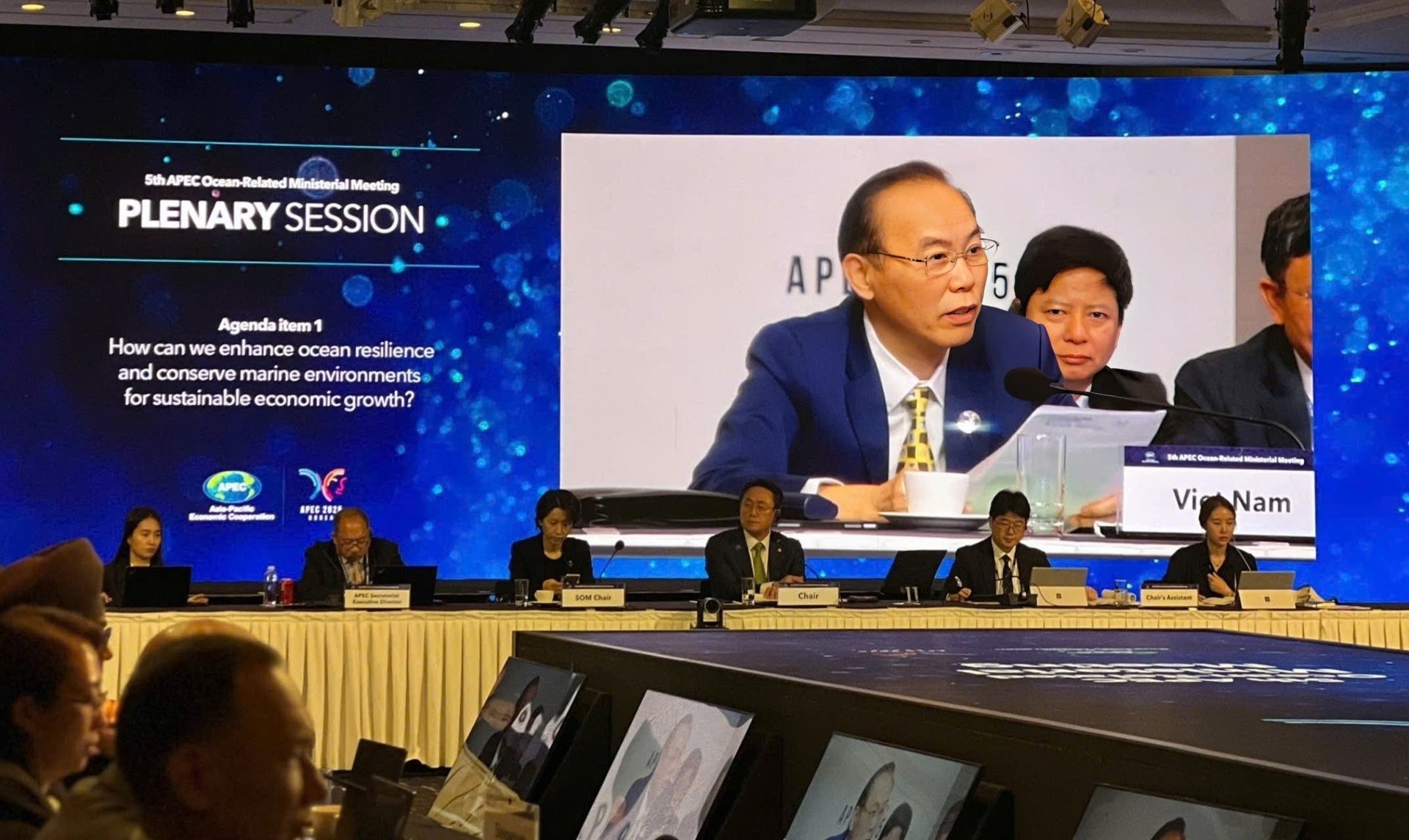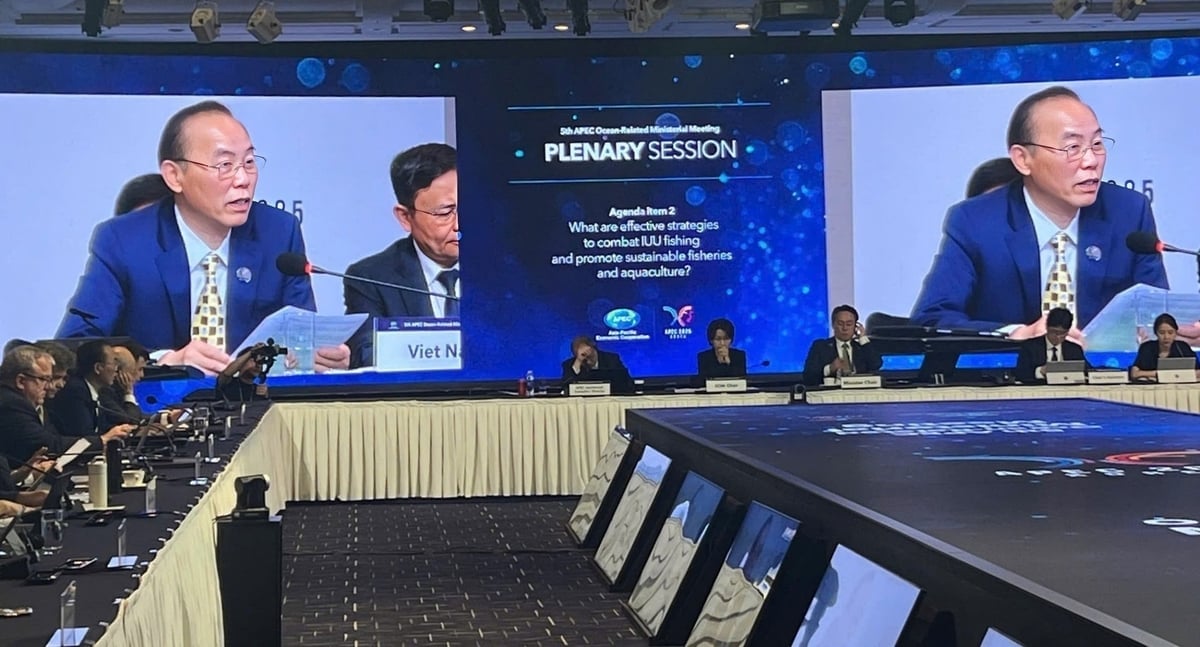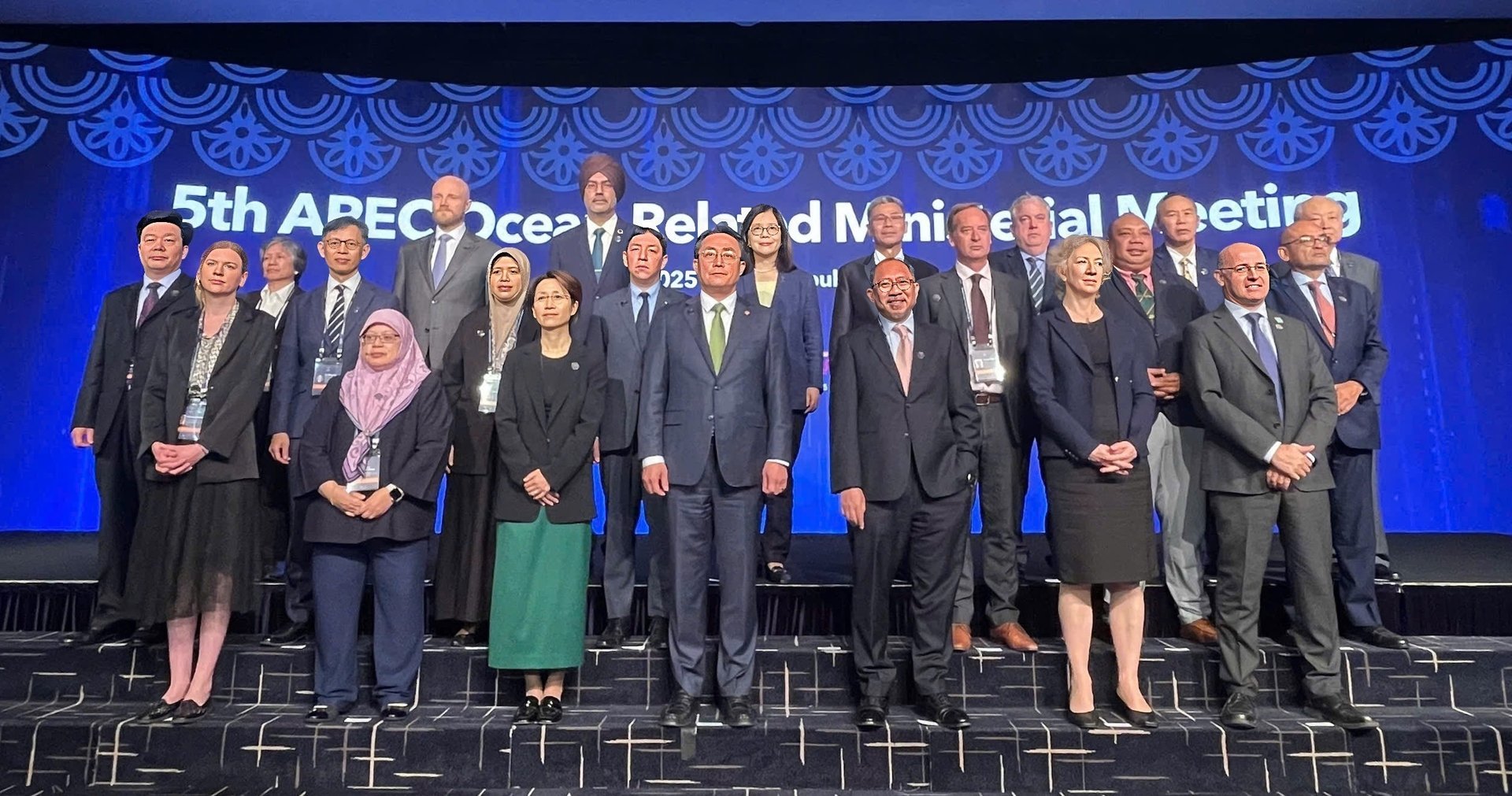December 1, 2025 | 21:22 GMT +7
December 1, 2025 | 21:22 GMT +7
Hotline: 0913.378.918
December 1, 2025 | 21:22 GMT +7
Hotline: 0913.378.918

The 5th APEC Ocean Ministerial Meeting (AOMM5) was held in Busan, South Korea. Photo: ICD.
On May 1, addressing the 5th APEC Ocean-Related Ministerial Meeting (AOMM5), the Deputy Minister Phung Duc Tien underscored the necessity of bolstering ocean resilience and protecting marine ecosystems to achieve sustainable economic growth in the context of climate change, environmental degradation, and overexploitation of marine resources.
To achieve a harmonious balance between ecological responsibility and economic development, Vietnam is currently executing an extensive range of marine conservation initiatives. In accordance with the Prime Minister's directive, the nation is presently in the process of formulating a national master plan for the protection of aquatic resources. Vietnam has established twenty marine protected areas as part of this strategy and is currently conducting research on other area-based conservation models, including Other Effective Area-based Conservation Measures (OECMs), to restore marine biodiversity and ecosystems.
Concurrently, Vietnam is promoting the shift from catches to aquaculture to guarantee sustainable livelihoods for coastal communities. Policies that promote public-private partnerships and co-management frameworks are instrumental in facilitating this transformation, which promotes inclusive participation among all stakeholder groups. Circular economy principles are also being integrated into aquaculture practices, with a focus on ecosystem-based and multi-value approaches that provide environmental and economic benefits while ensuring sustainability.
The Deputy Minister acknowledged that Vietnam has implemented community-driven initiatives to mitigate plastic waste in coastal and fishing areas in response to marine pollution. These encompass initiatives for waste collection, sorting, and exchange, as well as enhanced wastewater treatment and environmental monitoring at fishing terminals and aquaculture sites. Vietnam is also committed to bolstering international and regional collaboration in order to protect marine environments and improve ocean resilience.
Deputy Minister Tien emphasized Vietnam's dedication to enhancing its legal and institutional frameworks in relation to the issue of illicit, unreported, and unregulated (IUU) fishing. The country is implementing vessel monitoring systems, enforcing product traceability in seafood supply chains, rigorously penalizing violations, and providing support to fishers to ensure compliance with regulations. Furthermore, Vietnam is fostering the transition to sustainable marine aquaculture by collaborating with partners in the region and internationally to share information and harmonize fisheries legislation. It is also fulfilling international obligations related to marine protection and resource management and establishing legal avenues for offshore fishing operations.

Deputy Minister Phung Duc Tien affirmed that Vietnam is ready to share practical models and wishes to cooperate closely with APEC economies. Photo: ICD.
The economic empowerment of women and coastal communities within the marine and fisheries sectors is a priority for Vietnam. Economic empowerment must be equitable and inclusive. The nation is striving to increase the resilience of vulnerable populations to climate change by increasing their access to financial resources, natural capital, knowledge, and technology. The recognition of women's voices in policy programs and decision-making is on the rise, particularly in the fisheries value chain, which encompasses the entire process from harvesting and farming to refining and distribution. Achieving equitable benefits distribution among stakeholders necessitates transparent and effective support for public-private partnerships and co-management organizations.
Deputy Minister Tien reaffirmed Vietnam's willingness to share its practical models with other economies and conveyed a strong desire to collaborate with APEC partners in the construction of a green, prosperous, and sustainable future at the AOMM5.
Deputy Minister Tien acknowledged the challenges of Vietnam's fisheries sector, such as environmental pressures and climate change, in remarks delivered the day prior, on April 30. The 2017 Fisheries Law, national strategies for aquaculture and resource protection, and a marine plastic waste action plan tailored for the fisheries sector were among the main legal and strategic frameworks that he cited as already in place. Additionally, Vietnam is collaborating with international partners like FAO and ASEAN to safeguard coastal ecosystems, conserve biodiversity, and enhance the ability of coastal communities to adapt to the effects of climate change. Smart, sustainable development models across pertinent industries complement these endeavors.
Vietnam remains dedicated to its involvement in regional and global mechanisms that facilitate the exchange of information regarding IUU fishing and guarantee that fishers can operate in a secure manner and in accordance with sustainability regulations. Nevertheless, Deputy Minister Tien stressed that individual efforts by APEC members will not suffice in securing a healthy, sustainable ocean.

Deputy Minister Phung Duc Tien (top row, second from right) leads the delegation of the Ministry of Agriculture and Environment to attend the AOMM5 Conference. Photo: ICD.
He advocated for deeper collaboration and policy dialogue among economies to facilitate the development of marine resources that are multi-sectoral and integrated. These endeavors must ensure that economic development is in harmony with the stewardship of natural resources, which includes the promotion of responsible fishing and aquaculture practices, the protection of the marine environment, and the preservation of the livelihoods of coastal populations. He emphasized the ocean's critical economic and social role for all APEC economies, not just Vietnam, and encouraged collective action to establish a resilient blue economy.
The Vietnamese delegation also participated in working meetings with the National Institute of Fisheries Science (NIFS) in South Korea as part of the APEC mission. The two parties reached an agreement to enhance their collaboration in the areas of aquaculture research and experience sharing. Deputy Minister Tien suggested that South Korea maintain its support for Vietnam's fisheries sector by funding technical assistance initiatives through ODA.
Translated by Linh Linh

(VAN) The inevitable path forward is to reorganize production along the value chain, utilizing cooperatives as the core, enterprises as the driving force, and farmers as the central subjects.

(VAN) On November 28, Minister Tran Duc Thang, together with China's Minister of Agriculture and Rural Affairs Han Jun, chaired the 2nd meeting of the Viet Nam - China Agricultural Cooperation Committee.

(VAN) Forest carbon credits are only accepted when they ensure absolute environmental integrity, additionality, permanence, and transparency.

(VAN) Viet Nam partners with Beijing on controlling air pollution, cross-regional management, high-tech monitoring and relocating polluting facilities.

(VAN) With a USD 50 million investment, Australia is partnering with Viet Nam to operate its first public electric bus fleet and develop a nationwide EV charging network.

(VAN) On November 28, in Beijing, Minister Tran Duc Thang met Minister of Ecology and Environment of China Huang Runqiu, to share experience on environmental protection.
/2025/11/28/0950-2-120557_751.jpg)
(VAN) The recent flood spell in the South Central region clearly reflects the characteristics of natural disasters in 2025, which are compound, prolonged, and amplified.